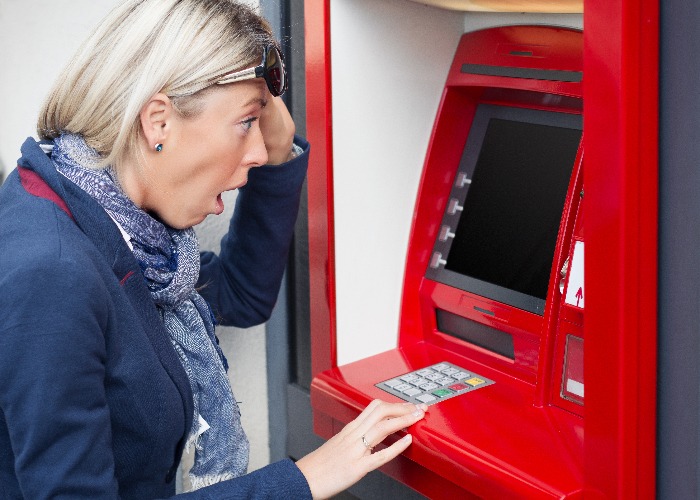Current account mistakes: 8 habits that make us poorer

Current accounts are one of the most important financial products in our lives, yet many of us are using them in a way that benefits the banks rather than ourselves.
Even the best of us still make mistakes with our current accounts, despite the fact we use them daily.
We've highlighted eight common mistakes, or bad habits, to avoid if you want to make the most of your bank account.
You’ve got the wrong account!
The first is simple: you’re using the wrong account! Chances are you've had the same account for years that no longer really suits your needs or maybe you were even mis-sold your account and pay for things that you don’t use.
It's a shame as you could be missing out on perks like interest, cashback and supermarket points.
The Chase current account, for example, lets you earn 1% cashback on fuel, everyday transport and groceries for the first 12 months, capped at £15 a month.
That means you could pocket £180 a year just for paying for things with a different bank account. (See more cashback current account options here)
And its not just cashback you could be missing out on: many banks offer access to exclusive table-topping savings accounts when you switch your bank to them, meaning you could supercharge your savings as well.
Not spotting 'zombie payments'
You're probably well aware of what you pay for things like your mortgage, energy bills and car insurance, but the cost of smaller outgoings can fall through the cracks.
Remember to review your statements regularly and look out for things you don’t make the most of or need, like gym memberships and subscriptions.
Citizens Advice has found that two million people have trouble cancelling subscriptions every year. Four out of five people who have been caught out didn’t even realise they’d signed up until the money came out of their account.
It's estimated that these so-called 'zombie payments' cost us £360 a year, so it’s best to keep a close eye on your account.
Not telling your bank about your holiday plans
In amongst all of the other things you need to get sorted before you go away, it can be easy to forget to ring up your bank to let it know that you'll be enjoying the sun for a few days.

If you then use your card abroad, your bank might suspect foul play and block your bank account for security reasons, leaving you penniless in Paris or broke in Brazil.
To be clear, not all banks require you to do this, so it might be worth checking your bank's app or website.
It's also worth looking at how much it is to withdraw cash from an ATM on your card.
Some providers charge almighty fees for taking money out abroad. Find out what your bank charges in our guide: Cheapest and most expensive debit card charges while abroad
Paying unnecessary overdraft fees
Do you dip into your overdraft now and again? Then you shouldn’t be paying overdraft fees. You can sign up to accounts which don’t have any fees at all, or which have a fee-free buffer.
And if you need that overdraft, make sure it’s arranged! Unarranged overdrafts will set you back significantly further.
First Direct has a £250 overdraft buffer on its 1st Account; anything beyond that has a 39.9% rate.
You’re switching without a bonus
If you are unhappy with your current bank, the good news is many banks will be more than happy to pay you to join them.
Santander is currently offering a £180 bung, while First Direct will pay you a slightl lower £175 sum.
But be warned, it’s not as if you can just bounce from current account to current account. In most cases you’ll need to have at least two active Direct Debits to show that you’re using the account.
Read more over at Best bank accounts for switching bonuses.
Not looking at what else your bank has to offer
Don’t just stop at the current account. Have a look at what else your provider has to offer. It could be travel insurance, mortgages or a credit card but you might get preferential rates for signing up if you’re an existing current account customer.
Failing to read the small print
This is especially true if you have a packaged current account.
The small print will reveal ways you might not be able to claim on a policy like the upper age limit on insurance and any trips on your travel insurance policy that are excluded such as winter sports and weddings abroad.
Ideally, you’d read this before signing the dotted line but it’s worth revisiting if you’re unsure. You may even have been mis-sold. Find out what to do if you’ve been mis-sold a packaged current account.
Read more at The best UK packaged current accounts.
Forgetting about old current account(s)
Some people find their spare change down the side of the couch, others from dormant current accounts.
The good news is that you can reclaim the cash if the account is still active. Your first port of call is your bank or building society – they’ll be able to find any old accounts and let you know if you’re eligible for any cash.
Use the My Lost Account website to track down any previous current accounts and reclaim your cash!
Comments
Be the first to comment
Do you want to comment on this article? You need to be signed in for this feature